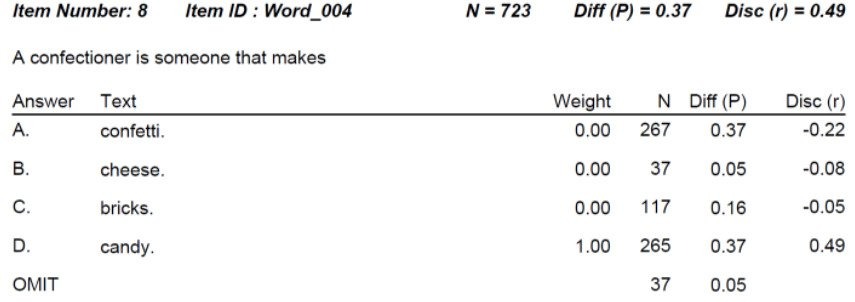A psychometrician is a data scientist who studies how to develop and analyze exams so that they are reliable, valid, and fair. Using psychometrics, Psychometricians implement aspects of engineering, data science, and machine learning to ensure that tests provide accurate information about people, so we can be confident about decisions based on test scores. They also often manage the test development process, including the design of blueprints and management of item writers.
Psychometricians are critical for many organizations. Because best practices are relevant for any type of assessment, psychometricians work on many exams: certification, licensure, pre-employment, university admissions, K-12, etc.
What is a psychometrician?

A psychometrician is like a lead engineer, applying best practices to produce a complex product that is reliable and serves the purpose of the test, such as predicting job performance. This involves planning, management of a team of specialists, ensuring quality control, and other leadership. However, psychometricians are often the type that like to get their hands dirty by writing code and analyzing data themselves. Psychometricians make sure that the tests are developed according to best practices like the APA/AERA/NCME Standards or NCCA Standards. More detail on tasks is provided below.
In some parts of the world, the term psychometrician refers to someone who administers tests, typically in a counseling setting, and does not actually know anything about the development or validation of tests. That usage is incorrect; such a person is a psychometrist, as you can see at the website for their association here. Even major sites like ZipRecruiter don’t do the basic fact-checking to get this straight.
Why do testing organizations need a psychometrician?
A psychometrician is essential to making good tests. The higher the stakes of the exam, the more that this is important. If you are working with a 5th grade math quiz for 30 students, then a PhD psychometrician is overkill. However, if you are working with a nationwide exam that certifies healthcare professionals, then it is incredibly important that the test is high quality, because patient lives are potentially on the line. A lot of work goes into developing such exams.
If you work for a credentialing organization, you likely need a psychometrician. Larger organizations typically hire their own as an in-house employee. Smaller organizations typically do not have the budget. Moreover, they likely do not have enough work to justify a full-time employee; perhaps they only release a new version of the test once per year which perhaps only takes a few months.
If this is the case, Assessment Systems can certainly help you – get in touch to talk with one of our psychometricians.
What does a Psychometrician do?
There are many steps that go into developing a high quality, defensible assessment. These differ by the purpose of the test. When working on professional certifications or employment tests, a job analysis is typically necessary and is frequently done by a psychometrician. Yet job analysis totally irrelevant for K-12 formative assessments; the test is based on a curriculum, so a psychometrician’s time is spent elsewhere.
Some topics include:
- Analyzing test data with item response theory or classical test theory to evaluate item performance (are questions too hard, too easy, too confusing?)
- Linking and equating to determine comparability of test scores across different forms or years
- Job analysis and test blueprint design
- Standard setting studies like modified-Angoff studies
- Item writing workshops
- Evaluate differential item functioning
- Assessment program design and management
- Designing adaptive tests
- Software design and development
- Manage the process of accreditation
This is a highly quantitative profession. Psychometricians spend most of their time working with datasets, using specially designed software or writing code in languages like R and Python.

A simple example of item analysis is shown below. This is an English vocabulary question. This question is extremely difficult; only 37% of students get it correct even though there is a 25% chance just by guessing. The item would probably be flagged for review. However, the point-biserial discrimination is extremely high, telling us that the item is actually very strong and defensible. Lots of students choose “confetti” but it is overwhelmingly the lower students, which is exactly what we want to have happen! The smarter students selected “candy.”
What skills do I need to become a Psychometrician?
There are two types of psychometrician: client-facing and data-facing. Though many psychometricians have skills in both domains.
Client-facing psychometricians excel in what one of my former employers called Client Engagements; parts of the process where you work directly with subject matter experts and stakeholders. Examples of this are job analysis studies, test design workshops, item writing workshops, and standard setting. All of these involve the use of an expert panel to discuss certain aspects. The skills you need here are soft skills; how to keep the SMEs engaged, meeting facilitation and management, explaining psychometric concepts to a lay person, and – yes – small talk during breaks!
Data-facing psychometricians focus on the numbers. Examples of this include equating, item response theory analysis, classical test theory reports, and adaptive testing algorithms. My previous employer called this the Client Reporting Team. The skills you need here are quite different, and center around data analysis and writing code.
How do I get a job as a Psychometrician?
First, you need a graduate degree. In this field, a Master’s degree is considered entry-level, and a PhD is considered a standard level of education. It can often be in a related area like I/O psychology. Given that level of education, and the requirement for advanced data science skills, this career is extremely well-paid.
Wondering what kind of opportunities are out there? Check out the NCME Job Board and Horizon Search, a headhunter for assessment professionals.
Where does a Psychometrician work?
They work any place that develops high-quality tests. Some examples:
- Large educational assessment organizations like ACT
- Governmental organizations like Singapore Examinations and Assessment Board
- Professional certification and licensure boards like the International Federation of Boards of Biosafety
- Employment testing companies like Biddle Consulting Group
- Medical research like PROMIS
- Universities like the University of Minnesota – mostly in purely academic roles
- Language assessment groups like Berlitz
- Testing services companies like ASC; such companies provide psychometric services and software to organizations that cannot afford to hire their own fulltime psychometrician. This is often the case with certification and licensure boards.
Can Psychometricians Work Remotely?
Psychometricians can indeed work remotely, leveraging advances in technology and the growing acceptance of remote work across various industries. The core tasks of a psychometrician, such as data analysis, test development, and validation studies, can be effectively performed using statistical software and online collaboration tools. Remote work allows psychometricians to access large datasets, conduct complex analyses, and communicate findings with teams from virtually any location, ensuring that their work remains impactful and efficient.
Are All They Created Equal?
Absolutely not! Like any other profession, there are levels of expertise and skill. I liken it to top-level athletes: there are huge differences between what constitutes a good football/basketball/whatever player in high school, college, and the professional level. And the top levels are quite elite; many people who study psychometrics will never achieve them.
Personally, I group psychometricians into three levels:
Level 1: Practitioners at this level are perfectly comfortable with basic concepts and the use of classical test theory, evaluating items and distractors with P and Rpbis. They also do client-facing work like Angoff studies; many Level 2 and Level 3 psychometricians do not enjoy this work.
Level 2: Practitioners at this level are familiar with advanced topics like item response theory, differential item functioning, and adaptive testing. They routinely perform complex analyses with software such as Xcalibre.
Level 3: Practitioners at this level contribute to the field of psychometrics. They invent new statistics/algorithms, develop new software, publish books, start successful companies, or otherwise impact the testing industry and science of psychometrics in some way.
Note that practitioners can certainly be extreme experts in other areas: someone can be an internationally recognized expert in Certification Accreditation or Pre-Employment Selection but only be a Level 1 psychometrician because that’s all that’s relevant for them. They are a Level 3 in their home field.
Do these levels matter? To some extent, they are just my musings. But if you are hiring a psychometrician, either as a consultant or an employee, this differentiation is worth considering!

Nathan Thompson earned his PhD in Psychometrics from the University of Minnesota, with a focus on computerized adaptive testing. His undergraduate degree was from Luther College with a triple major of Mathematics, Psychology, and Latin. He is primarily interested in the use of AI and software automation to augment and replace the work done by psychometricians, which has provided extensive experience in software design and programming. Dr. Thompson has published over 100 journal articles and conference presentations, but his favorite remains https://scholarworks.umass.edu/pare/vol16/iss1/1/ .

